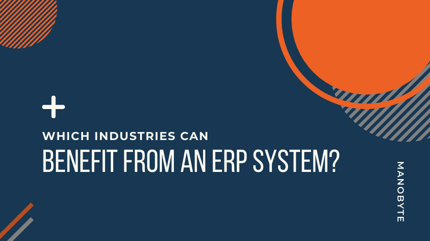Which Industries can Benefit from an ERP System?
Chelsea Carter

Enterprise resource planning (ERP) has been used in the manufacturing sector since the 1990’s. Back then, the tool was used to manage accounting and human resources. Today, ERPs are fully customizable and can be used across a variety of departments, including finance, operations, retail, and sales. This has prompted many professionals to ask if they need to switch over to an ERP software.
Benefits of ERP Systems
- Improve and strengthen security
- House knowledge and support for various departments
- Apply accurate real-time data to make better business decisions
- Stay on top of regulations
- Give employees more tools to increase revenue and hit sales goals
- Bring your business with you with cloud mobile-accessibility
Industries and ERPs
Manufacturing
ERP software is increasingly beneficial to the manufacturing sector. By using a cloud-based ERP, finance, purchasing, production and operations departments are able to communicate with ease. A study by Aberdeen Group found that 48% of manufacturing leaders claim industry-specific software would aid them in doing business more efficiently.
Teams are able to set up custom alerts, dashboards and modules based on the task needed. Finance departments are able to set up custom reporting and projections, while operations and production teams are able to set up alerts for low inventory levels, broken machines, and recalls. If combined with a CRM, recall alerts are able to be sent to every affected customer and vendor. Additionally, sales teams are able to communicate directly with warehouse teams to ensure real-time inventory accuracy and realistic client expectations.
Healthcare
A healthcare ERP software system can help you handle daily activities in the sector, including the procurement and sourcing of essential items. Additionally, payroll, utilities, and waste management reports are able to be closely monitored. Data from the HIMSS Analytics Logic platform show that the adoption of Hospital ERP software has grown to 38.4% in 2018 from barely 18.8% a decade ago.
ERP’s accounting tools also enable you to manage finances across the healthcare system effectively. Together with business intelligence tools, an ERP software system can provide you with crucial metric analysis, such as quality of care versus costs of care. Additionally, by working with a PRM system, ERPs in healthcare are able to closely monitor relationships, clients, and researchers.
Hospitality
ERP software helps hotels monitor staff, cleaning schedules, waste collection, scheduled and canceled appointments, and keep track of vacancies. ERP software enables hotel managers to keep all vital information in a single place to minimize duplicates and conflicting data like double-booked rooms. Additionally, ERPs can be used to help monitor the restaurants and activities within a hotel.
Waste Management
Waste Management can greatly benefit from the use of an ERP. The industry’s dynamics usually react instantly to new legislations and regulations being implemented to toughen waste regulation and reporting duties, which make it the ideal candidate for an ERP system. When working alongside a CRM, ERPs are able to send instant alerts and contract updates throughout the cloud channel.
Applications For ERP In Waste Management
- Classifying, recycling and production recording processes
- Managing hazardous substances
- Quality assessment
- Short-term and long-term transport planning
- Managing and monitoring container
- Order processing
- Contract management
- Expanded mapping of business partnerships
Education
An ERP software system can be a valuable tool for academic and research facilities in managing their logistical needs. Schools are able to ensure the stock levels of essential items, track the best vendors to use, and manage initiatives with ease. Financial teams are able to ensure grants and funding are properly allocated and modules can be designed to track enrollment and government grant spending.
Retail
ERP software use in retail is extremely valuable to help keep up with increasing customer demands. By combining ERP software with a CRM, sales associates and account managers are able to access their cross-channel with ease. By being able to view warehouse levels in real-time, your team can ensure accurate stock levels.
Customized Modules For Retail:
- Product discount offers
- Individual product financials, such as FIFO or LIFO breakdowns
- Allocation of stock between locations
- Stock transfer
- Robust replacement for AS400
Retail ERP software offers a reliable, simple, and quick management solution necessary for a more efficient business operation.
Construction
ERP software offers robust data analytics for several construction processes, including:
- Asset management
- Submittals
- Scheduling
- Customer Relationship Management (CRM)
- Bid Management
- Vendor Management
- Project Management
- Human Capital Management
- Inventory or Equipment Management
- Contractor Management
- Financial Management
By integrating various systems into an all-inclusive solution, you can have all the essential tools to manage a project’s full lifecycle. This is vital because the use of improper document management, scheduling, and accounting software can delay construction projects and the company’s growth itself. The absence of integrated software solutions is potentially damaging to the construction project if unexpected circumstances arise.
Customized ERP functions allow companies to personalize their ERP as needed. Allowing full customization between departments allows your business to run smoothly and facilitates communication, all of which allow your business to grow efficiently. When you partner with ManoByte to set up your ERP, we ensure the implementation is successful and meets your business’s unique needs. Contact our Business Growth Consultants if you are ready to see how an ERP can help scale your business.
Ready to Dive In?
Work with our team of HubSpot experts and watch us take clunky systems, tech stacks, websites, and portals and turn them into tailored, intelligent workflows that deliver business outcomes.



